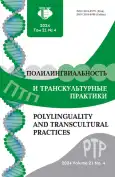Destructive Discourse in the Modern Conditionsof Belarusian-Russian Bilingualism
- 作者: Lavitski A.A.1,2
-
隶属关系:
- Belarusian State Pedagogical M. Tank University
- Vitebsk Branch of the International University “MITSO”
- 期: 卷 21, 编号 4 (2024)
- 页面: 632-640
- 栏目: Language in System
- URL: https://journal-vniispk.ru/2618-897X/article/view/326887
- DOI: https://doi.org/10.22363/2618-897X-2024-21-4-632-640
- EDN: https://elibrary.ru/DDJSGA
- ID: 326887
如何引用文章
全文:
详细
The study presents the findings of a study of Belarusian destructive discourse in the comparative aspect of the language code used (the Belarusian and Russian languages). Destructive discourse in the paper is understood in the legal linguistic aspect as a practice of verbal interaction, the content of which does not correspond to the dispositions of the legal field. In this regard, texts sent by investigative and inquiry bodies and courts for linguistic examination were used as factual research material (in total, 74 units were selected for 2021-2023: 56 Russian-speaking, 18 Belarusian-speaking). The quantitative parameters of the studied texts correlate with statistical data on the preferences of Belarusian citizens in using language as a means of interpersonal and institutional communication. As a result of the analysis, it was established that there are no serious discrepancies in the extralinguistic characteristics of conflict-producing texts. They are subject to active digitalization and gravitate towards small genre forms. At the same time, Belarusian-language texts are less likely to have a creolized form. More differences are found in the sociolinguistic portrait of the subject of the destructive discourse implementation: a Belarusian-speaking delinquent usually has a higher education and is older in age. Male participants dominate in both types of destructive communication.
作者简介
Anton Lavitski
Belarusian State Pedagogical M. Tank University; Vitebsk Branch of the International University “MITSO”
编辑信件的主要联系方式.
Email: anton_lavitski@mail.ru
ORCID iD: 0000-0002-9102-4440
SPIN 代码: 7318-7002
Researcher ID: М-2526-2018
PhD in Philology, Associate Professor, Postdoctoral student, Belarusian State Pedagogical M. Tank University; Head of the Department of Law and Social and Humanitarian Disciplines of Vitebsk branch of the International University “MITSO”
18 Sovetskaya St, Minsk, 220030, Belarus; 8A M. Shagala, Vitebsk, 210010, Belarus参考
- Volkova, Y.A., and N.N. Panchenko. 2016. “Destructiveness in political discourse.” Russian Journal of Linguistics, vol. 20, no. 4, pp. 160-171. https://doi.org/10.22363/2312-9182-2016-20-4-160-178 (In Russ.)
- Yakova, I.A. 2015. “The power of the discourse of the media space in the struggle for nomination.” Journal of Tomsk State University. Philology, no. 3, pp. 122-134. Print. (In Russ.)
- Oshchepkova, N.A. 2021. “Destructive strategies in political discourse.” Journal of Kaluga University, no. 4, pp. 20-23. https://doi.org/10.54072/18192173_2021_4_20. (In Russ.)
- Plotnikova, A.M. 2018. Conflict communication in the aspect of forensic linguistics. Ekaterinburg-Moscow: ТХТ publ. Print. (In Russ.)
- Baranov, A.N. 2017. “Linguistics in linguistic expertise (method and truth).” Journal of Volgograd State University. Ser. 2. Linguistics, vol. 16, no. 2, pp. 18-27. Print. (In Russ.)
- Lavitski, A.A. 2023. “Parametric Triangulation in Forensic Linguistic Expertise: on the Example of Insult.” RUDN Journal of Language Studies, Semiotics and Semantics, vol. 14, no. 2, pp. 383-401. https://doi.org/10.22363/2313-2299-2023-14-2-383-401. (In Russ.)
- Benveniste, E. 1985. On Discourse. The Theoretical Essays: Film, Linguistics, Literature. Manchester: Manchester Uni. Press. Print. (In Russ.)
- Karasik, V.I., and G.G. Slyshkin. 2021. “Modern discourse developmental Trends.” Current Issues in Philology and Pedagogical Linguistics. Thematic issue: Multidimensionality of discourse, no 1, pp. 14-31. https://doi.org/10.29025/2079-6021-2021-1-14-31. (In Russ.)
- Bogolyubov, A.F. 2020. “Bring Us Deliverance, Spy! (Interpretations of The Spies’ March in Time of the Media War and Pandemic).” NSU Vestnik. Series: Linguistics and Intercultural Communication, vol. 18, no. 2, pp. 132-153. https://doi.org/10.25205/1818-7935-2020-18-2-132-153. (In Russ.)
- Sorokin, Yu.A., and E.F. Tarasov. 1990. “Creolized texts and their communicative function.” Optimization of collective speech influence: monograph; Academy of Sciences of the USSR; Institute of Linguistics; edited by R.G. Kotov. Moscow: Nauka publ., 1990, pp. 180-186. Print. (In Russ.)
- Jakobson, R.O. 1985. Language in relation to other communication systems. Moscow: Nauka publ. Print. (In Russ.)
- Linguistic encyclopedic dictionary. 1990. Edited by V.N. Yartseva. Moscow: Soviet Encyclopedia publ. Print. (In Russ.)
补充文件









